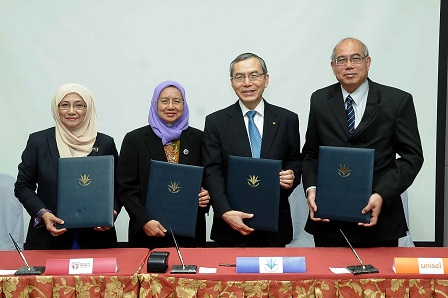
By: Noor Eszereen Juferi
Photo: Marina Ismail
SERDANG – The Institute of Bioscience (IBS) Universiti Putra Malaysia (UPM), Universiti Malaysia Terengganu (UMT) and Universiti Selangor (UNISEL) are collaborating in a dynamic and high impactful micro algae research under the Japanese Science Technology Research Partnership Strategy (SATREPS).
UPM Vice-Chancellor, Prof. Datin Paduka Dr. Aini Ideris said the collaboration could bolster the country’s aquaculture industry as the source for food and raw materials for future generation.
“The Japanese International Cooperation Agency (JICA) and the Japanese Science and Technology Agency with the cooperation of the Japanese Government and Malaysia will start a large scale culture system beginning next April for five years in the production of micro algae and efficient and cost-effective micro algae culture techniques.
“The development of a photobioreactor for a large scale biomass culture micro algae and a nutrient recycling technology from aquaculture waste as well as the transfer of new technology in aquaculture farm will be carried out under this collaboration,” she said after witnessing the signing of a Memorandum of Agreement (MOA) between the parties involved in the project.
Soka University, University of Tokyo, Tokyo Institute of Technology and the National Institute of Environmental Studies are among those institutes involved in the collaboration.
UPM IBS Marine Biotechnology Head of Laboratory, Prof. Dr. Fatimah Md. Yusoff said the innovation will contribute to the development of high quality vitamins and food for the aquaculture industry, production of health supplements as well as pharmaceutical goods.
“In addition, the best farm practices and techniques will be introduced to obtain nutrients from the sludge recycling aquaculture ponds, thus making them efficient in reducing environmental pollution. Micro algae contains carotenoid, flavonoid and fatty acids that could be utilized in the food industry,” she said. – UPM.
Date of Input: |
Updated: | amir_peli
MEDIA SHARING



























